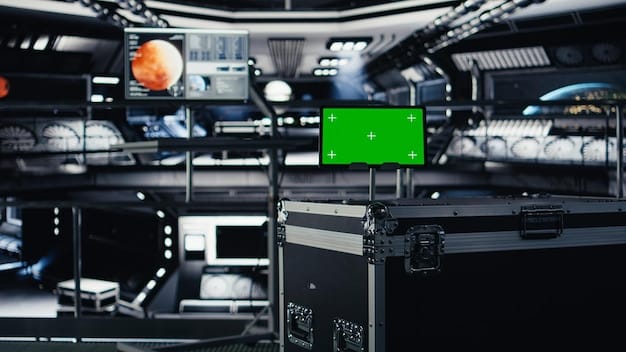Esports Careers Beyond Pro Gaming in the US

Beyond the limelight of professional play, the US esports industry offers a multitude of fulfilling career paths, spanning from broadcast production and team management to data analytics and content creation, accessible with diverse skill sets and educational backgrounds.
The allure of becoming a professional esports player is undeniable, a dream for many. However, the fiercely competitive nature and inherent volatility of a pro gaming career mean that only a select few ever reach the pinnacle. For aspirants in the United States, thankfully, the rapidly expanding esports ecosystem offers a plethora of compelling Esports Career Paths Beyond Pro Gaming: Opportunities in the US. These roles are critical to the industry’s growth and sustainability, providing stable, impactful avenues for individuals passionate about competitive gaming.
The Expanding Landscape of Esports and Its Workforce Needs
Esports has transcended its niche origins to become a global phenomenon, particularly in the United States. This meteoric rise isn’t solely fueled by professional players; it demands a robust support infrastructure comprising diverse professionals. From the conceptualization of tournaments to their live broadcast and intricate marketing, every facet requires specialized expertise.
The industry’s complexity necessitates a workforce that can bridge the technical aspects of gaming with traditional business and media practices. This includes roles that manage the financial health of organizations, ensure the integrity of competition, and craft engaging narratives for millions of viewers. As esports cements its place in mainstream entertainment, the demand for skilled individuals in these non-gaming capacities continues to surge.
Growth Factors Driving Non-Gaming Roles
Several key factors contribute to the proliferation of career opportunities beyond professional play. These include the substantial investments from traditional sports organizations and venture capitalists, the increasing viewership numbers across various streaming platforms, and the formalization of educational programs pertaining to esports.
- Increased Investment: Major brands and investors are pouring capital into esports, leading to more sophisticated operations.
- Rising Viewership: The millions watching esports events create demand for high-quality production and content.
- Educational Programs: Universities and colleges are offering degrees and certificates in esports management, broadcasting, and related fields.
Moreover, the technological advancements in live streaming, data analysis, and virtual reality are continuously opening new frontiers, requiring adaptable professionals who can innovate within this fast-paced environment. The symbiotic relationship between gaming, technology, and entertainment ensures that these roles are not just temporary diversions but becoming integral parts of long-term career planning.
Event Management and Production: Bringing Esports to Life
Behind every electrifying esports tournament is a team of dedicated professionals meticulously planning and executing every detail. Event management in esports is a multifaceted discipline, encompassing everything from venue selection and logistics to ticketing and fan engagement. This field demands exceptional organizational skills, attention to detail, and the ability to thrive under pressure.
The production side transforms competitive gaming into a captivating spectacle. This involves a complex interplay of audiovisual elements, live commentary, replays, and graphics, all seamlessly integrated to provide a polished viewing experience. These roles are instrumental in shaping public perception of esports and attracting new audiences, demanding both technical prowess and creative flair.
Key Roles in Event Management and Production
Various specialists contribute to the success of an esports event. These roles are often analogous to those found in traditional sports or entertainment production, but with a unique understanding of the gaming landscape.
- Event Manager: Oversees all logistical aspects, from venue negotiation to vendor coordination.
- Production Director: Manages the technical and creative flow of broadcasts, ensuring high-quality output.
- Broadcast Engineer: Handles audio, video, and network infrastructure for live streams and events.
- Stage Manager: Coordinates on-site activities, ensuring smooth transitions between segments and player readiness.
Beyond these, numerous support roles like lighting technicians, sound engineers, graphic designers, and replay operators are vital. The collaborative nature of event production means that strong teamwork and communication are just as crucial as individual technical abilities. This sector is particularly dynamic, constantly adapting to new technologies and audience expectations.

Team and Player Support: The Backbone of Competitive Success
Professional esports teams, much like traditional sports franchises, rely heavily on a robust support system to optimize player performance and team cohesion. These roles extend far beyond coaching and encompass psychological, logistical, and strategic aspects that contribute to a competitive edge. The well-being and peak performance of players are paramount, requiring a dedicated network of specialists.
This category of careers focuses on nurturing talent, managing team dynamics, and ensuring players have everything they need to concentrate on their game. It’s about building a sustainable environment where athletes can thrive, both individually and as part of a collective unit, making these roles critically important for long-term success in the competitive arena.
Diverse Support Roles for Players and Teams
The array of professionals supporting esports teams is constantly evolving, mirroring the increasing professionalization of the industry. These positions often require a blend of interpersonal skills, an understanding of esports culture, and relevant professional qualifications.
- Team Manager: Handles logistics, scheduling, travel, and day-to-day operations for the team.
- Coach/Analyst: Provides strategic insights, reviews gameplay, and helps players improve their skills.
- Sports Psychologist: Focuses on mental well-being, stress management, and performance psychology for players.
- Physiotherapist/Trainer: Addresses physical health, injury prevention, and ergonomic setup for long gaming sessions.
Additionally, content creators within teams help document their journey, fostering fan engagement, while legal and financial advisors ensure compliance and stability. These roles create a holistic support structure, allowing players to focus intensely on improving their game without extraneous distractions. The growth of player unions and associations will further increase the demand for legal and advocacy roles within this sphere.
Content Creation and Broadcasting: Engaging the Audience
The appeal of esports largely stems from its accessibility and the engaging content generated around it. Content creation and broadcasting encompass a vast array of roles dedicated to reaching and entertaining the global audience. From live commentary during matches to behind-the-scenes documentaries and community interaction, these professionals are the face and voice of the industry.
Effective content creation requires not only a deep understanding of the games but also strong storytelling abilities, technical proficiency in media production, and a keen sense of what resonates with viewers. These careers are vital for building fan bases, attracting sponsors, and ensuring the continued growth in viewership numbers, which are key metrics for the industry’s health.
Pathways in Content and Broadcast
Within this field, opportunities range from highly visible on-camera roles to crucial behind-the-scenes technical and creative positions. Adaptability and a passion for engaging an audience are common threads across these diverse pathways.
- Caster/Commentator: Provides live play-by-play and analytical commentary during matches.
- Streamer/Influencer: Builds a personal brand by playing games, interacting with viewers, and creating original content.
- Video Editor/Producer: Crafts compelling video content, from highlights to documentaries and promotional materials.
- Social Media Manager: Manages online presence, engages with the community, and drives content distribution.
Other essential roles include graphic designers who create visual assets, writers who craft narratives and scripts, and camera operators capturing critical moments. The demand for creative and technically skilled individuals in this sector is perpetually high, as the fight for audience attention intensifies. Success here often depends on blending creativity with analytical understanding of digital media trends.
Business, Marketing, and Sponsorship: Fueling the Ecosystem
Like any major entertainment industry, esports thrives on robust business practices, innovative marketing strategies, and lucrative sponsorship deals. These non-endemic career paths are crucial for the financial sustainability and expansion of the entire ecosystem. Professionals in these fields are responsible for generating revenue, building brand recognition, and forging strategic partnerships that propel teams, events, and organizations forward.
This sector requires astute business acumen, negotiation skills, and a comprehensive understanding of the esports market and its target demographics. It involves creating win-win scenarios for brands, leveraging fan engagement, and translating the excitement of competitive gaming into tangible commercial value. These roles are foundational to the industry’s professionalization.
Key Business and Marketing Avenues
The business side of esports attracts individuals with backgrounds in traditional business, marketing, and sales, who are also passionate about gaming. These roles are critical for monetizing the sport and ensuring its economic viability.
- Partnership/Sponsorship Manager: Identifies, negotiates, and maintains relationships with corporate sponsors.
- Marketing Director: Develops and executes marketing campaigns to promote teams, leagues, and events.
- Sales Manager: Drives revenue through merchandise, advertising, and other commercial ventures.
- Financial Analyst: Manages budgets, forecasts revenue, and assesses financial health of organizations.
Additional roles such as legal counsel, human resources, and business development managers are also integral, ensuring smooth operations and strategic growth. The intersection of traditional business principles with the dynamic esports landscape creates unique challenges and opportunities, requiring creative solutions and forward-thinking strategies. This section of the industry is undergoing rapid professionalization, demanding a higher caliber of business and marketing talent.

Technology, Data, and Analytics: The Future of Esports
The digital native nature of esports means that technology, data, and analytics play an even more critical role than in traditional sports. These fields are at the forefront of innovation, driving performance insights, audience understanding, and the technical infrastructure that underpins the entire industry. Professionals in these areas are often the unsung heroes, providing the tools and intelligence that empower players, teams, and businesses.
From developing cutting-edge game analysis tools to managing complex cloud infrastructures for live streams, these careers demand strong technical skills and a curious, analytical mindset. The ability to extract meaningful insights from vast datasets and translate them into actionable strategies is a highly valued commodity in the competitive landscape of esports, influencing everything from player recruitment to marketing segmentation.
Innovating Through Tech and Data
These specialized roles are integral to maintaining esports’ competitive edge and enhancing the user experience. They require expertise in various technical domains, often at the intersection of gaming and computer science.
- Data Scientist/Analyst: Collects, analyzes, and interprets game and audience data to provide strategic insights.
- Software Engineer: Develops tools for game analysis, league management, and fan platforms.
- IT Administrator: Manages network infrastructure, servers, and cybersecurity for esports organizations and events.
- Game Developer (Esports Specific): Focuses on creating or adapting games for competitive play, balancing, and anti-cheat measures.
Emerging areas like virtual reality (VR) and augmented reality (AR) integration for enhanced viewing experiences, and artificial intelligence (AI) for predictive analytics and competitive balancing, are opening new roles for highly specialized technical professionals. The rapid evolution of technology ensures that this sector will continue to be a hotbed of innovation and opportunity within the esports ecosystem.
Education, Research, and Community Development: Cultivating the Next Generation
As esports matures, the importance of academic programs, rigorous research, and robust community development initiatives becomes increasingly apparent. These roles aim to formalize knowledge, understand the industry’s broader societal impact, and nurture talent from the grassroots level. They are essential for building a sustainable future for esports, ensuring a healthy pipeline of skilled professionals and engaged participants.
Professionals in education and research contribute to the academic discourse around esports, developing curricula, conducting studies on player health or audience behavior, and legitimizing the field in academic circles. Community development focuses on organizing amateur leagues, fostering local talent, and creating inclusive environments that welcome new players and fans, laying the groundwork for wider adoption and appreciation of competitive gaming.
Building Foundations for Growth
These areas focus on the long-term health and growth of the esports ecosystem, often combining passion for gaming with a drive for education and social impact.
- Esports Educator/Professor: Teaches esports management, strategy, or production at universities and colleges.
- Researcher: Conducts academic studies on esports trends, player psychology, or industry economics.
- Community Manager: Fosters positive online and offline communities around games, teams, or leagues.
- Youth Esports Coordinator: Organizes and manages scholastic or recreational esports programs for younger age groups.
Furthermore, advocacy roles promoting diversity and inclusion within esports, as well as roles focused on player welfare and ethical standards, are gaining prominence. The development of robust educational pathways means that individuals entering the industry now have more structured opportunities for learning and career progression, moving beyond self-taught methods to formal qualifications. This sector is crucial for ensuring esports remains a vibrant and responsible industry.
| Key Area | Brief Description |
|---|---|
| 🏟️ Event & Production | Organizing and broadcasting esports tournaments and events with technical and creative precision. |
| 🤝 Team & Player Support | Providing crucial resources for player wellness and performance, including coaching and management. |
| 🎥 Content & Broadcasting | Creating engaging media, from live commentary to captivating documentaries and social media. |
| 💰 Business & Marketing | Driving revenue through sponsorships, marketing campaigns, and financial management. |
Frequently Asked Questions About Esports Careers Beyond Pro Gaming
▼
Many educational backgrounds are suitable, including degrees in business, marketing, communications, computer science, and even specialized esports management programs. Practical experience through internships and volunteering is equally, if not more, valuable. Adaptability and a willingness to learn are crucial as the industry is constantly evolving.
▼
Absolutely. Many roles in esports, such as event management, broadcasting, marketing, and sports psychology, have direct parallels in traditional sports. Your experience in these areas is highly transferable. A strong understanding of the esports landscape and its unique culture will greatly aid your transition into this dynamic industry.
▼
Salaries vary widely depending on the role, experience, company size, and specific responsibilities. Entry-level positions might range from $35,000 to $50,000 annually, while mid-career professionals can expect $60,000 to $100,000+. Senior and specialized roles, like directors or lead analysts, can command six-figure salaries or more, reflecting the growing demand for expertise.
▼
While direct professional gaming experience isn’t required, a genuine passion for and understanding of video games and esports culture is highly beneficial. It helps in understanding the audience, communicating effectively with players, and creating authentic content. Many roles benefit from a foundational knowledge of popular titles and their competitive scenes, showing commitment to the industry.
▼
You can find opportunities on general job boards like LinkedIn and Indeed, specialized esports job sites, and company career pages of major esports organizations (e.g., Riot Games, Activision Blizzard, ESL). Attending industry events and networking with professionals are also excellent ways to uncover hidden opportunities and build valuable connections in the rapidly expanding US esports market.
Conclusion
The esports industry in the United States offers a rich tapestry of career paths extending far beyond the highly competitive realm of professional gaming. From the meticulous planning of major events and the strategic support of competitive teams to the creative efforts of content creators and the essential contributions of business and data professionals, the opportunities are as diverse as they are dynamic. Individuals looking to translate their passion for gaming into a meaningful career will find a burgeoning ecosystem ripe with possibilities. Navigating this exciting landscape requires a blend of specialized skills, adaptability, and an unyielding commitment to an industry continuously pushing the boundaries of sports and entertainment.





